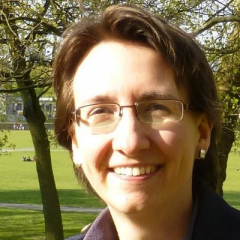
Berkman Community Newcomers: Dorothea Kleine
This post is part of a series featuring interviews with some of the fascinating individuals who joined our community for the 2014-2015 year. Conducted by our 2014 summer interns (affectionately known as "Berkterns"), these snapshots aim to showcase the diverse backgrounds, interests, and accomplishments of our dynamic 2014-2015 community.
Profile of Dorothea Kleine
Berkman faculty associate and Director of ICT4D Centre
@dorotheakleine
interviewed in summer 2014 by Berktern Pamela Mishkin
Dorothea Kleine is interested in big picture issues such as whether people have choices in their technology use, and how these might differ between individuals or between cultures. “Does ICT (Information and Communications Technology) make people more or less free? Who should decide what technology use is possible? States? Companies? People themselves?”
While she is based in the U.K. as Director of the interdisciplinary ICT4D Centre at Royal Holloway, University of London, Kleine makes regular visits to Berkman as a Faculty Associate to work collaboratively on ICT and youth projects. The ICT4D Centre recently published, with UNICEF, a key report on ICT, children and development.
“Colleagues at Berkman are doing some excellent work on youth and media. At the recent Digitally Connected Forum, a great event hosted here at Harvard by Berkman and UNICEF, we found some exciting ways in which we can collaborate in the future,” Kleine explains.
She will also spend much of the year working on her next book, focused on, “how we might use ICTs for collective action to tackle some really big challenges, such as collective behavioral change towards respect for the environment, social justice and cultural diversity within globalization, and fostering socially and environmentally sustainable economies.”
Her recent book, Technologies of Choice: ICTs, Development and the Capabilities Approach – which she wrote in part as a visiting researcher at Berkman – builds on Amartya Sen’s idea that development is about expanding the freedom people have to live the lives they themselves have reason to value. Kleine argues that for ICT4D projects, success needs to be measured by the extent to which they provide people freedom. Kleine believes that “rather than focusing on a priori goals set by funders in Washington, Geneva, London, Tokyo or Bonn and using ICTs to get those goals ‘delivered,’ we need to assess the impact of ICTs in supporting people using these tools to make their lives easier and indeed socially, economically or culturally richer – and recognizing the potential negative effects of ICTs.” Given the very real structural barriers people with fewer resources face, she sees the need to make sure that the playing field does not get even more uneven through uneven access to ICTs. Though she recognizes the potential downside of ICTs and acknowledges digital divides, Kleine believes that ICTs can also be used “in transformative ways to empower the disadvantaged.”
“One of the great things about ICTs,” she explained, “is that they are multi-purpose technologies. The Internet, mobile phones or even SMS are so incredibly versatile. It’s not just relevant for agriculture, but also for health, for education, for banking, for keeping in touch, for personal safety, for political expression – and significantly, for a whole host of other things people may choose to use it for. There are some transformative applications of the technologies that have the potential to even the playing field a bit and give disadvantaged groups a better chance, such as free or low cost access to information, to self-expression, or ways of reporting abuse.”
Her book also describes her Choice Framework, which maps the development process as an overall system, with different feedback loops taking into account the resources people have, the social structures that they navigate, the choices that they make and the outcomes for their lives. She explains how her framework allows researchers, practitioners, and policy-makers to map specific development, technology or policy innovations onto the diagram of the system and then see which bits of the system might be affected. “I get emails from people who are applying it in the US, Kenya, Australia, and South Africa,” she explained. “One of the practitioners has described it as their ‘checklist for ICT4D design’ but it’s more dynamic than a checklist.” She’s continuing to work with other researchers and practitioners, including colleagues at CSIR in South Africa on co-developing it further.
As a Faculty Associate, she will be a part of the Berkman community and will be contributing to its intellectual and social life – both on her regular visits to Harvard as well as virtually. “I’m excited to be engaging with colleagues, or indeed anybody involved in ICT4D work, at Berkman or in the wider Boston area. As we develop our ICT4D Centre-Berkman collaborative work with children, youths and ICT, or indeed as I write my next book, I am looking forward to the exchanges we will have. And of course our ICT4D Centre at Royal Holloway, University of London is also a place where Berkman colleagues and researchers at different career stages, are very welcome to come and visit and be part of our community as well.”
Notes:
Dorothea Kleine’s book, Technologies of Choice – Information and Communication Technologies and Development is out with MIT Press.
The UNICEF Report on Children, ICTs and Development is available as a free e-book.